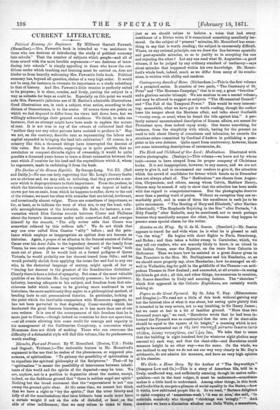Miracles, Past and Present. By W. 'Mountford. (Boston, U.S.: Fields
and Osgood ; Trhbner.)—The noticeable feature in Mr. Mountford's argument is the use that he makes of the phenomena, or supposed phe- nomena, of spiritualism. "To gainsay the possibility of spiritualism is to repudiate the spiritual philosophy of the Scriptures." That—if by " spiritualism " is meant the possibility of intercourse between inhabi- tants of this world and the spirits of the departed—may be true. We are, anyhow, not in a position to dogmatize about the matter, except, indeed, on the Sadducee ground that " there is neither angel nor spirit." Nothing but the broad statement that the "supernatural is not " can sweep the ground quite clear. At the same time, we cannot but think that we have a right to " try the spirits ;" that the utter fatuity and folly of all the manifestations that have hitherto been made must have a certain weight if not on the side of disbelief, at leaston the side of utter indifference; that we may refuse to listen to them, just as we should refuse to believe a voice that had every semblance of a Divine voice, if it enunciated something manifestly im- moral. On the subject of " present " miracles, Mr. Mountford has some- thing to say that is worth reading ; the subject is enormously difficult. Where, on any rational principle, can we draw the line between apostolic and post-apostolic miracles, so as to justify us in accepting the one and rejecting the other ? Let any one read what St. Augustine—a good witness, if he be judged by any ordinary standard of testimony—says, about miracles that happened within his own knowledge. Mr. Mount- ford's whole book, indeed, much as we differ from many of its conclu- sions, is written with ability and candour.


































 Previous page
Previous page